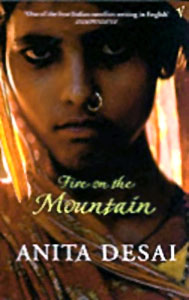 `Fire on the Mountain` by Anita Desai is set at the backdrop of the Simla hills, wonderfully portraying the Indian life and the stages of old age. The intricacies of relationship, the palpation of kinship gains an enunciation in the novel "Fire on the Mountain".
`Fire on the Mountain` by Anita Desai is set at the backdrop of the Simla hills, wonderfully portraying the Indian life and the stages of old age. The intricacies of relationship, the palpation of kinship gains an enunciation in the novel "Fire on the Mountain".
Anita Desai is a writer who deals with the various subjects starting from common village life to the human relationship and their various aspects. Throughout her novels and short stories, Desai focuses on the personal struggles of Anglicized, middle-class women in contemporary India. Her characters always attempt to overcome the societal limitations imposed by a tradition-bound patriarchal culture. In her writing both pre independence as well as post independence scenario is prevalent. Most of the novels by the author are set among the cultural and social changes that have swept India since its independence from Britain in 1947. All of these formalize the importance of inherited bonds and explore the tensions that exist between different generations. She has taken some varied subjects in some of her later works, and these can be mentioned as `German anti-Semitism`, `the dissolution of traditional Indian values`, and `Western stereotypes of India`. Desai had all the criteria to become a contemporary writer. She has also been identified with a new literary tradition of Indian writing in English, which is stylistically different and less conservative than colonial Indian literature and concerns such issues as hybridity, shifting identity, and "imaginary homelands." She has won various awards for her literary work.
Synopsis:
This novel by Anita Desai is written in her strikingly original style. Nanda Kaul, an elderly lady, decides to live a secluded life in Carignano in Kausali. All she wishes to entertain is stillness and calm in this period of her life. She spends all her life in the care of others, her three daughters and her husband. She never gets time to feel for herself. Her own choice, her own world was gone somewhere. And in this process she suffered from nimiety, the disorder caused by the fluctuating and unpredictable excess of the presence of family members, friends and acquaintances. When one day Nanda receives a letter from her daughter Asha asking her to take care of her great-granddaughter Raka, a feeling of anger, disappointment and loathing arises in her. She doesn`t feel like conversing again, she doesn`t want to make sure of another`s life and comfort, she doesn`t want to get involved anymore. She is just not bothered about the worldly matters. Raka comes in Nanda`s life and things starts changing in different way. Nanda is a recluse out of vengeance for a long life of duty and obligation; Raka is a recluse by nature and instinct. Her parents have long given up to try to socialize her. But slowly the child has the capacity to change things and Nanda discovers new needs within herself. When finally violence explodes, she has to face the truth.
Being published by South Asia books, Harper Collins, William Heinemann Ltd., Minerva, Vintage, etc. `Fire on the Mountain` an original novel by Anita Desai full of delicate observations about human nature and parental relationships.
This creation of Anita Desai is again a marvelous one. The intricacy of human relationship is illustrated beautifully in this novel. This is the sad tale of three women whose story resemblance a large number of women of the society. The story also touches humour in some parts. As a whole this is worth reading book by the author and winner of various awards namely National Academy of Letters Awards in 1978 and the Winifred Holtby Memorial Prize in 1977.













